Business Research Methodology Assignment: Research Analysis
VerifiedAdded on 2020/04/21
|6
|1329
|142
Homework Assignment
AI Summary
This assignment analyzes various aspects of Business Research Methodology. It begins by examining the use of qualitative research in generating personal narratives from senior managers in the public sector, focusing on theme-based analysis and descriptive design. The assignment then delves into the role of Corporate Social Responsibility (CSR) in enhancing firm value, exploring the use of secondary research and highlighting key findings on CSR's impact on employee productivity, market expansion, and corporate reputation. Ethical considerations in research are also addressed, emphasizing the importance of obtaining approval, adhering to ethical guidelines, and the four principles of ethics: respect for autonomy, beneficence, non-maleficence, and justice. Finally, the assignment discusses hidden populations and the application of snowball sampling, including its biases and limitations. The document concludes with a list of references.
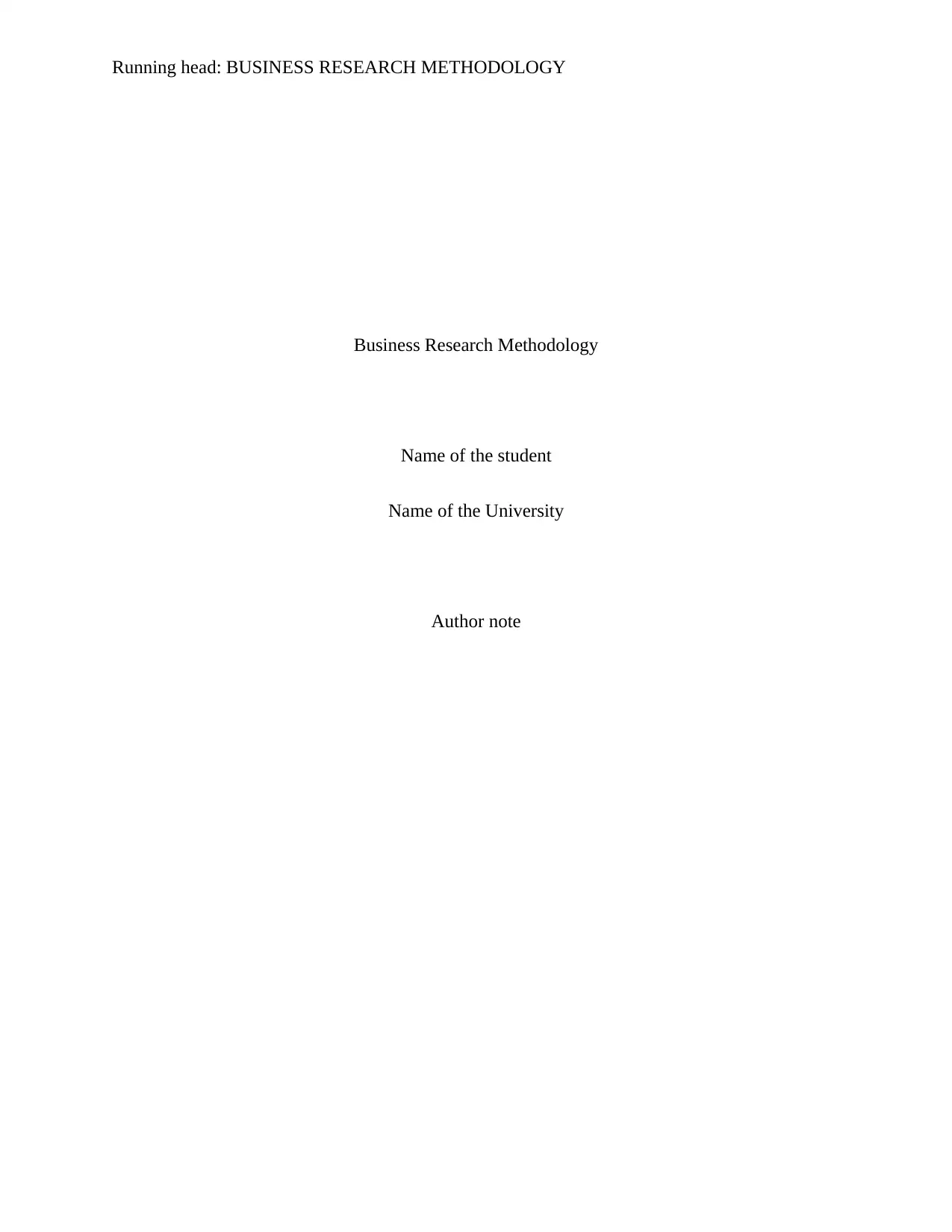
Running head: BUSINESS RESEARCH METHODOLOGY
Business Research Methodology
Name of the student
Name of the University
Author note
Business Research Methodology
Name of the student
Name of the University
Author note
Paraphrase This Document
Need a fresh take? Get an instant paraphrase of this document with our AI Paraphraser
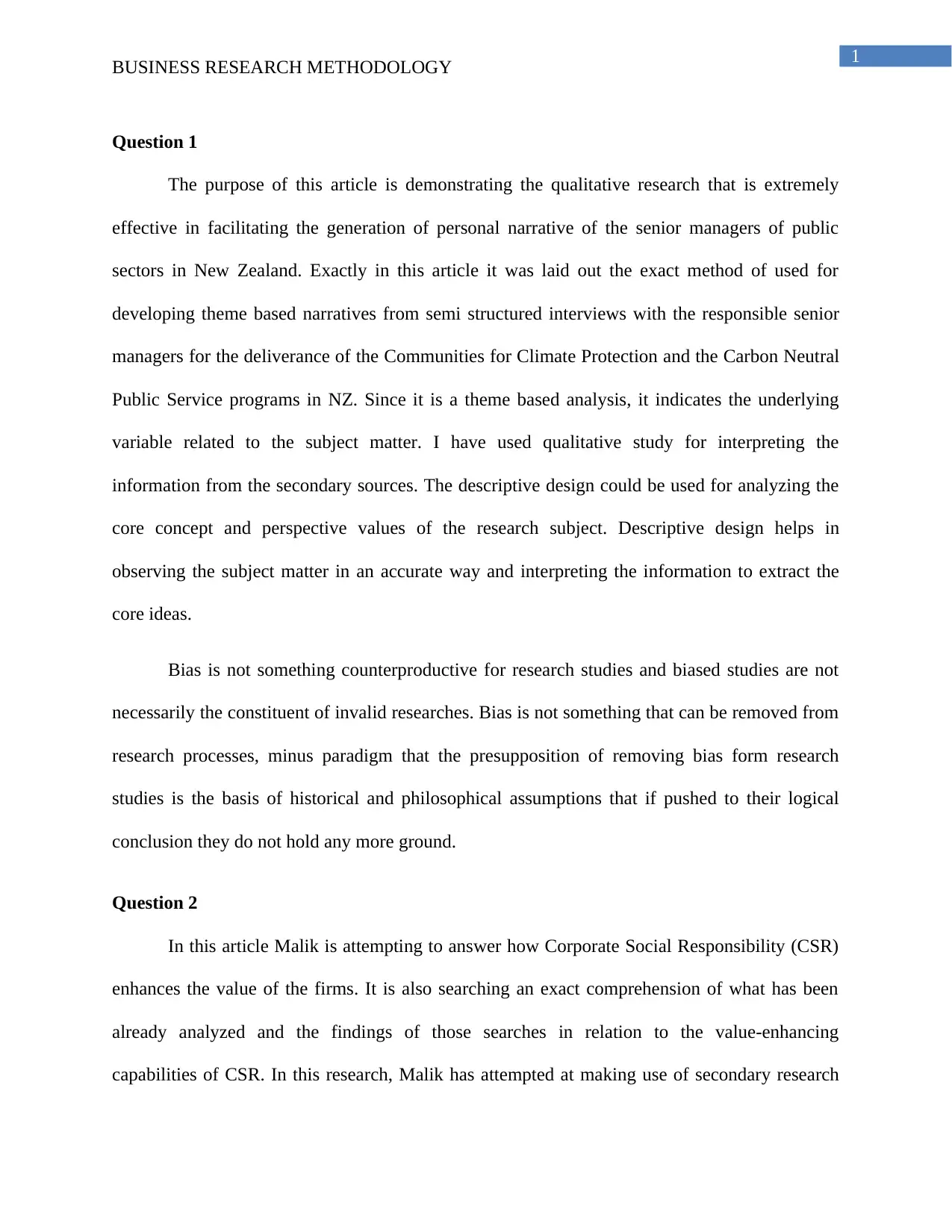
1
BUSINESS RESEARCH METHODOLOGY
Question 1
The purpose of this article is demonstrating the qualitative research that is extremely
effective in facilitating the generation of personal narrative of the senior managers of public
sectors in New Zealand. Exactly in this article it was laid out the exact method of used for
developing theme based narratives from semi structured interviews with the responsible senior
managers for the deliverance of the Communities for Climate Protection and the Carbon Neutral
Public Service programs in NZ. Since it is a theme based analysis, it indicates the underlying
variable related to the subject matter. I have used qualitative study for interpreting the
information from the secondary sources. The descriptive design could be used for analyzing the
core concept and perspective values of the research subject. Descriptive design helps in
observing the subject matter in an accurate way and interpreting the information to extract the
core ideas.
Bias is not something counterproductive for research studies and biased studies are not
necessarily the constituent of invalid researches. Bias is not something that can be removed from
research processes, minus paradigm that the presupposition of removing bias form research
studies is the basis of historical and philosophical assumptions that if pushed to their logical
conclusion they do not hold any more ground.
Question 2
In this article Malik is attempting to answer how Corporate Social Responsibility (CSR)
enhances the value of the firms. It is also searching an exact comprehension of what has been
already analyzed and the findings of those searches in relation to the value-enhancing
capabilities of CSR. In this research, Malik has attempted at making use of secondary research
BUSINESS RESEARCH METHODOLOGY
Question 1
The purpose of this article is demonstrating the qualitative research that is extremely
effective in facilitating the generation of personal narrative of the senior managers of public
sectors in New Zealand. Exactly in this article it was laid out the exact method of used for
developing theme based narratives from semi structured interviews with the responsible senior
managers for the deliverance of the Communities for Climate Protection and the Carbon Neutral
Public Service programs in NZ. Since it is a theme based analysis, it indicates the underlying
variable related to the subject matter. I have used qualitative study for interpreting the
information from the secondary sources. The descriptive design could be used for analyzing the
core concept and perspective values of the research subject. Descriptive design helps in
observing the subject matter in an accurate way and interpreting the information to extract the
core ideas.
Bias is not something counterproductive for research studies and biased studies are not
necessarily the constituent of invalid researches. Bias is not something that can be removed from
research processes, minus paradigm that the presupposition of removing bias form research
studies is the basis of historical and philosophical assumptions that if pushed to their logical
conclusion they do not hold any more ground.
Question 2
In this article Malik is attempting to answer how Corporate Social Responsibility (CSR)
enhances the value of the firms. It is also searching an exact comprehension of what has been
already analyzed and the findings of those searches in relation to the value-enhancing
capabilities of CSR. In this research, Malik has attempted at making use of secondary research
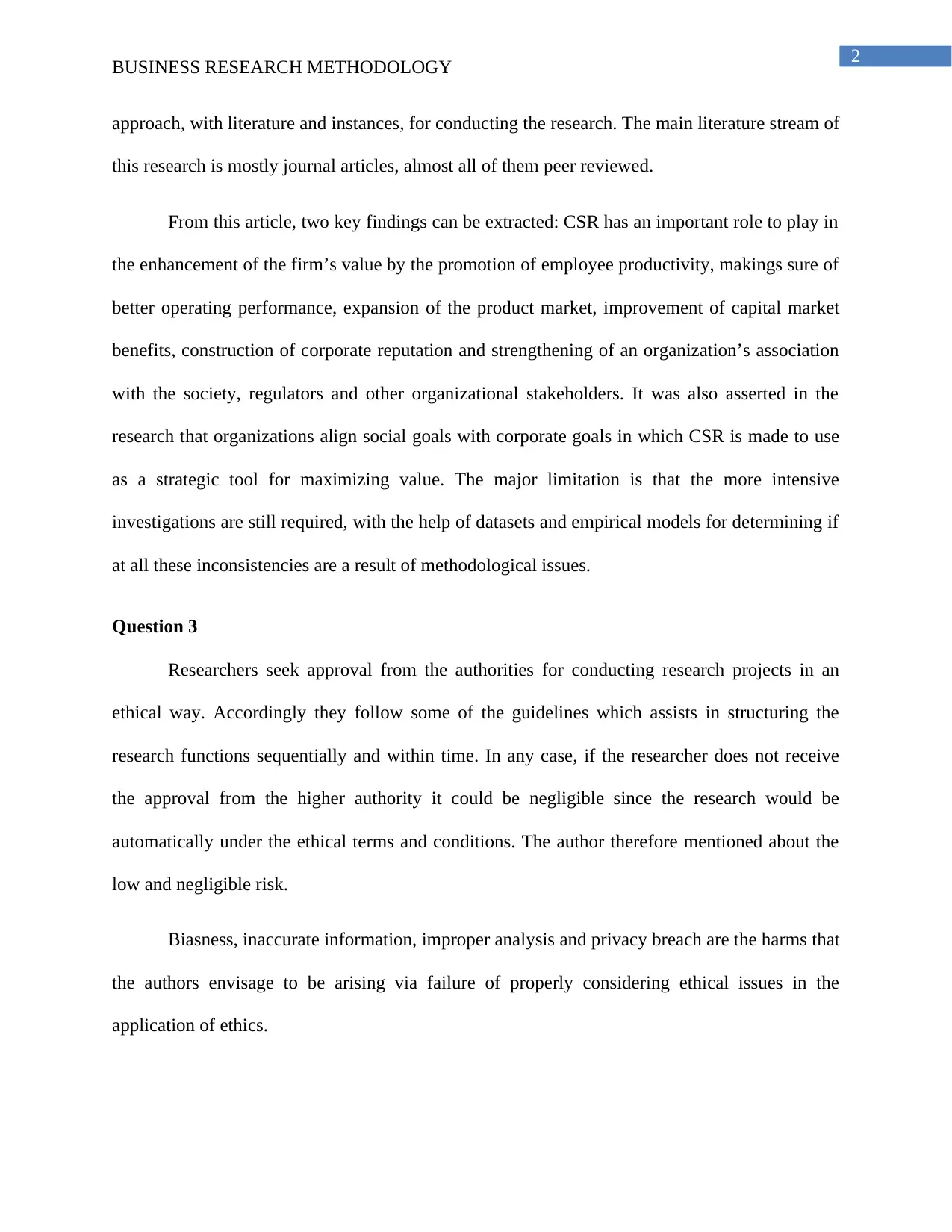
2
BUSINESS RESEARCH METHODOLOGY
approach, with literature and instances, for conducting the research. The main literature stream of
this research is mostly journal articles, almost all of them peer reviewed.
From this article, two key findings can be extracted: CSR has an important role to play in
the enhancement of the firm’s value by the promotion of employee productivity, makings sure of
better operating performance, expansion of the product market, improvement of capital market
benefits, construction of corporate reputation and strengthening of an organization’s association
with the society, regulators and other organizational stakeholders. It was also asserted in the
research that organizations align social goals with corporate goals in which CSR is made to use
as a strategic tool for maximizing value. The major limitation is that the more intensive
investigations are still required, with the help of datasets and empirical models for determining if
at all these inconsistencies are a result of methodological issues.
Question 3
Researchers seek approval from the authorities for conducting research projects in an
ethical way. Accordingly they follow some of the guidelines which assists in structuring the
research functions sequentially and within time. In any case, if the researcher does not receive
the approval from the higher authority it could be negligible since the research would be
automatically under the ethical terms and conditions. The author therefore mentioned about the
low and negligible risk.
Biasness, inaccurate information, improper analysis and privacy breach are the harms that
the authors envisage to be arising via failure of properly considering ethical issues in the
application of ethics.
BUSINESS RESEARCH METHODOLOGY
approach, with literature and instances, for conducting the research. The main literature stream of
this research is mostly journal articles, almost all of them peer reviewed.
From this article, two key findings can be extracted: CSR has an important role to play in
the enhancement of the firm’s value by the promotion of employee productivity, makings sure of
better operating performance, expansion of the product market, improvement of capital market
benefits, construction of corporate reputation and strengthening of an organization’s association
with the society, regulators and other organizational stakeholders. It was also asserted in the
research that organizations align social goals with corporate goals in which CSR is made to use
as a strategic tool for maximizing value. The major limitation is that the more intensive
investigations are still required, with the help of datasets and empirical models for determining if
at all these inconsistencies are a result of methodological issues.
Question 3
Researchers seek approval from the authorities for conducting research projects in an
ethical way. Accordingly they follow some of the guidelines which assists in structuring the
research functions sequentially and within time. In any case, if the researcher does not receive
the approval from the higher authority it could be negligible since the research would be
automatically under the ethical terms and conditions. The author therefore mentioned about the
low and negligible risk.
Biasness, inaccurate information, improper analysis and privacy breach are the harms that
the authors envisage to be arising via failure of properly considering ethical issues in the
application of ethics.
⊘ This is a preview!⊘
Do you want full access?
Subscribe today to unlock all pages.

Trusted by 1+ million students worldwide
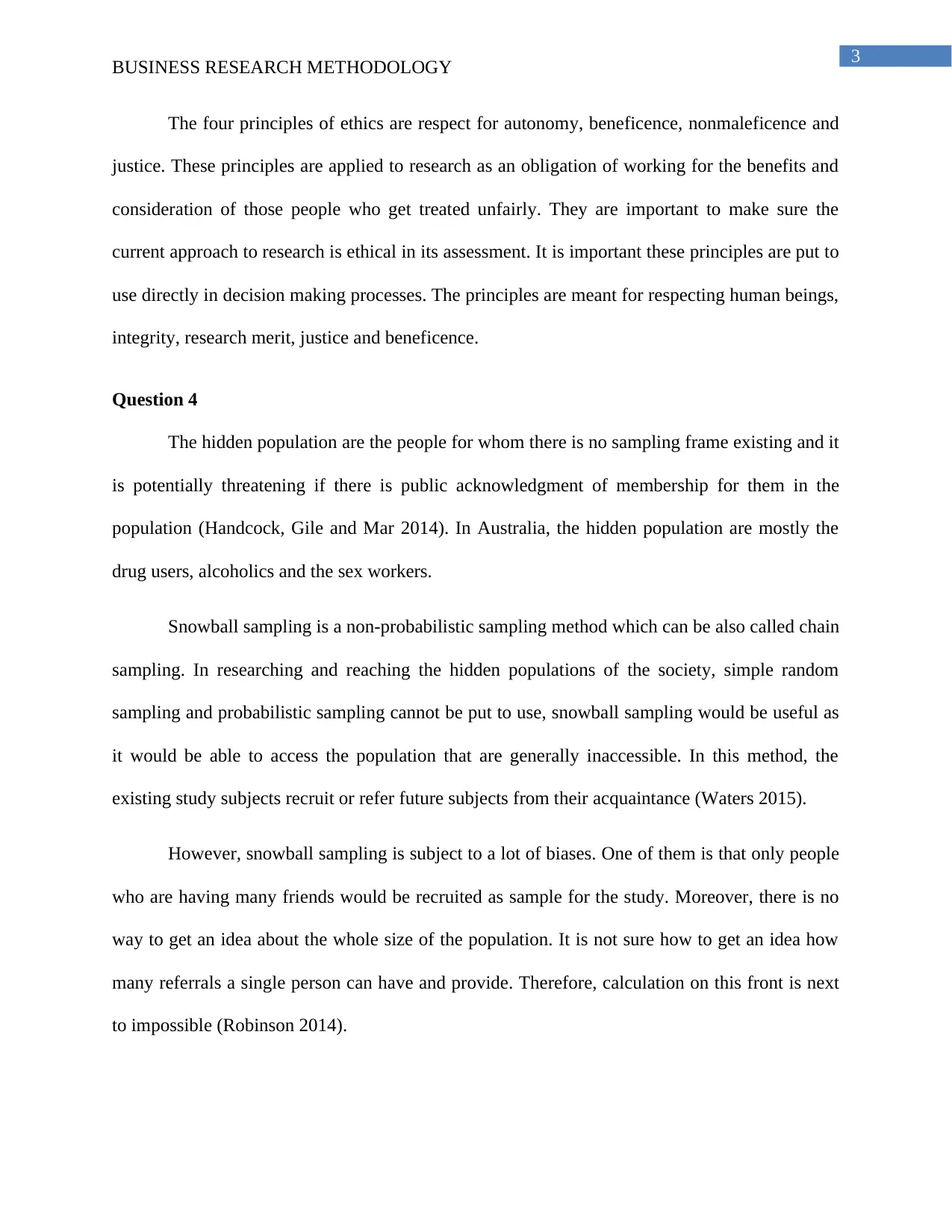
3
BUSINESS RESEARCH METHODOLOGY
The four principles of ethics are respect for autonomy, beneficence, nonmaleficence and
justice. These principles are applied to research as an obligation of working for the benefits and
consideration of those people who get treated unfairly. They are important to make sure the
current approach to research is ethical in its assessment. It is important these principles are put to
use directly in decision making processes. The principles are meant for respecting human beings,
integrity, research merit, justice and beneficence.
Question 4
The hidden population are the people for whom there is no sampling frame existing and it
is potentially threatening if there is public acknowledgment of membership for them in the
population (Handcock, Gile and Mar 2014). In Australia, the hidden population are mostly the
drug users, alcoholics and the sex workers.
Snowball sampling is a non-probabilistic sampling method which can be also called chain
sampling. In researching and reaching the hidden populations of the society, simple random
sampling and probabilistic sampling cannot be put to use, snowball sampling would be useful as
it would be able to access the population that are generally inaccessible. In this method, the
existing study subjects recruit or refer future subjects from their acquaintance (Waters 2015).
However, snowball sampling is subject to a lot of biases. One of them is that only people
who are having many friends would be recruited as sample for the study. Moreover, there is no
way to get an idea about the whole size of the population. It is not sure how to get an idea how
many referrals a single person can have and provide. Therefore, calculation on this front is next
to impossible (Robinson 2014).
BUSINESS RESEARCH METHODOLOGY
The four principles of ethics are respect for autonomy, beneficence, nonmaleficence and
justice. These principles are applied to research as an obligation of working for the benefits and
consideration of those people who get treated unfairly. They are important to make sure the
current approach to research is ethical in its assessment. It is important these principles are put to
use directly in decision making processes. The principles are meant for respecting human beings,
integrity, research merit, justice and beneficence.
Question 4
The hidden population are the people for whom there is no sampling frame existing and it
is potentially threatening if there is public acknowledgment of membership for them in the
population (Handcock, Gile and Mar 2014). In Australia, the hidden population are mostly the
drug users, alcoholics and the sex workers.
Snowball sampling is a non-probabilistic sampling method which can be also called chain
sampling. In researching and reaching the hidden populations of the society, simple random
sampling and probabilistic sampling cannot be put to use, snowball sampling would be useful as
it would be able to access the population that are generally inaccessible. In this method, the
existing study subjects recruit or refer future subjects from their acquaintance (Waters 2015).
However, snowball sampling is subject to a lot of biases. One of them is that only people
who are having many friends would be recruited as sample for the study. Moreover, there is no
way to get an idea about the whole size of the population. It is not sure how to get an idea how
many referrals a single person can have and provide. Therefore, calculation on this front is next
to impossible (Robinson 2014).
Paraphrase This Document
Need a fresh take? Get an instant paraphrase of this document with our AI Paraphraser
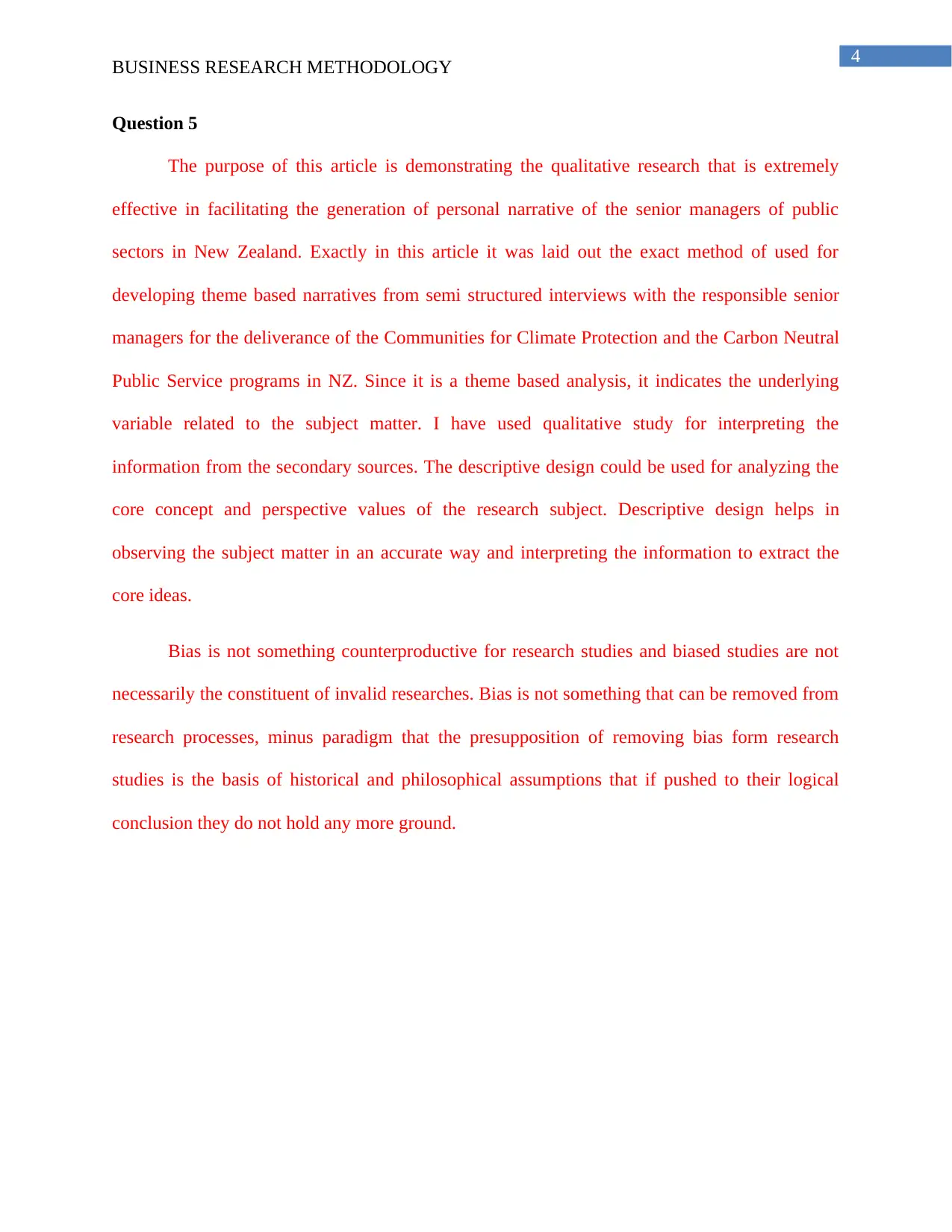
4
BUSINESS RESEARCH METHODOLOGY
Question 5
The purpose of this article is demonstrating the qualitative research that is extremely
effective in facilitating the generation of personal narrative of the senior managers of public
sectors in New Zealand. Exactly in this article it was laid out the exact method of used for
developing theme based narratives from semi structured interviews with the responsible senior
managers for the deliverance of the Communities for Climate Protection and the Carbon Neutral
Public Service programs in NZ. Since it is a theme based analysis, it indicates the underlying
variable related to the subject matter. I have used qualitative study for interpreting the
information from the secondary sources. The descriptive design could be used for analyzing the
core concept and perspective values of the research subject. Descriptive design helps in
observing the subject matter in an accurate way and interpreting the information to extract the
core ideas.
Bias is not something counterproductive for research studies and biased studies are not
necessarily the constituent of invalid researches. Bias is not something that can be removed from
research processes, minus paradigm that the presupposition of removing bias form research
studies is the basis of historical and philosophical assumptions that if pushed to their logical
conclusion they do not hold any more ground.
BUSINESS RESEARCH METHODOLOGY
Question 5
The purpose of this article is demonstrating the qualitative research that is extremely
effective in facilitating the generation of personal narrative of the senior managers of public
sectors in New Zealand. Exactly in this article it was laid out the exact method of used for
developing theme based narratives from semi structured interviews with the responsible senior
managers for the deliverance of the Communities for Climate Protection and the Carbon Neutral
Public Service programs in NZ. Since it is a theme based analysis, it indicates the underlying
variable related to the subject matter. I have used qualitative study for interpreting the
information from the secondary sources. The descriptive design could be used for analyzing the
core concept and perspective values of the research subject. Descriptive design helps in
observing the subject matter in an accurate way and interpreting the information to extract the
core ideas.
Bias is not something counterproductive for research studies and biased studies are not
necessarily the constituent of invalid researches. Bias is not something that can be removed from
research processes, minus paradigm that the presupposition of removing bias form research
studies is the basis of historical and philosophical assumptions that if pushed to their logical
conclusion they do not hold any more ground.
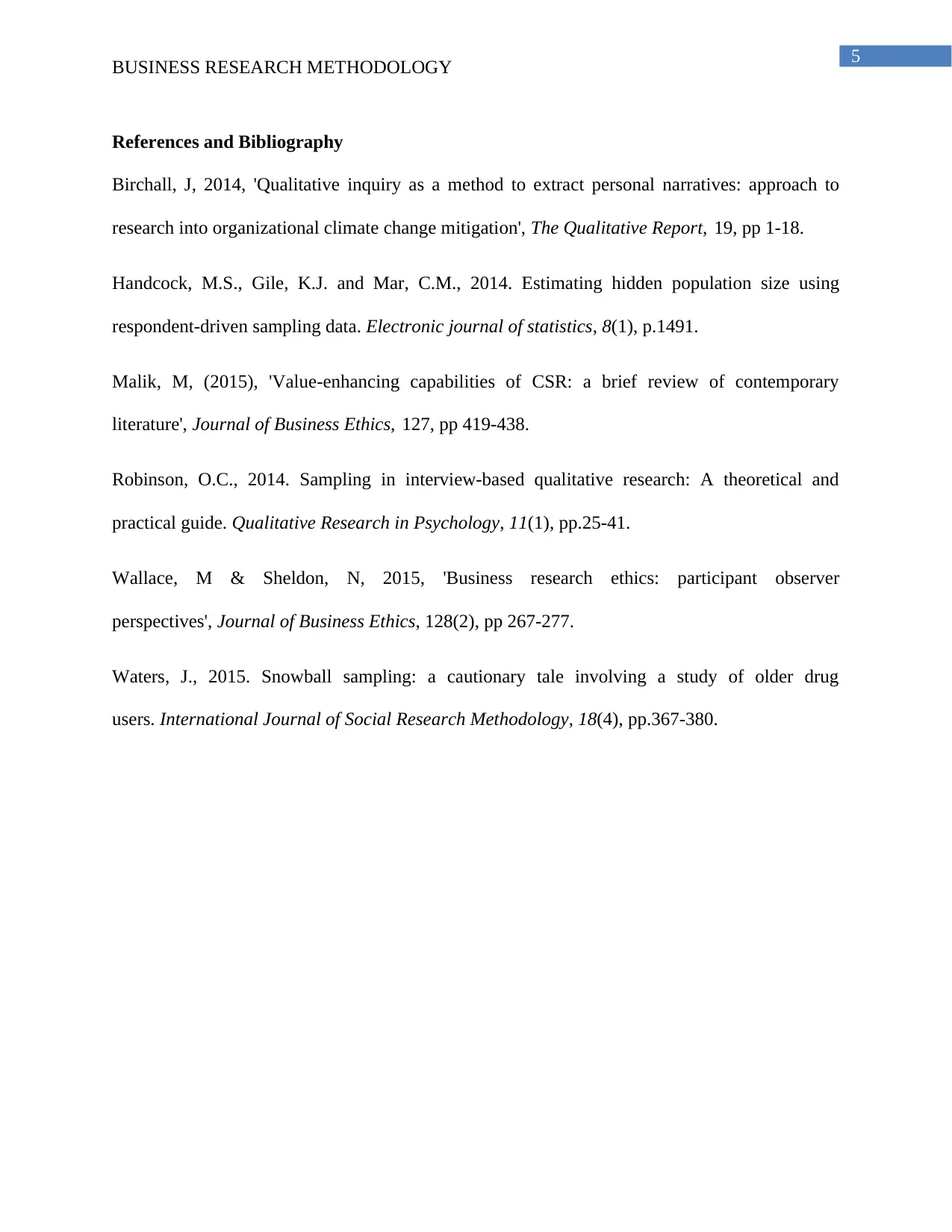
5
BUSINESS RESEARCH METHODOLOGY
References and Bibliography
Birchall, J, 2014, 'Qualitative inquiry as a method to extract personal narratives: approach to
research into organizational climate change mitigation', The Qualitative Report, 19, pp 1-18.
Handcock, M.S., Gile, K.J. and Mar, C.M., 2014. Estimating hidden population size using
respondent-driven sampling data. Electronic journal of statistics, 8(1), p.1491.
Malik, M, (2015), 'Value-enhancing capabilities of CSR: a brief review of contemporary
literature', Journal of Business Ethics, 127, pp 419-438.
Robinson, O.C., 2014. Sampling in interview-based qualitative research: A theoretical and
practical guide. Qualitative Research in Psychology, 11(1), pp.25-41.
Wallace, M & Sheldon, N, 2015, 'Business research ethics: participant observer
perspectives', Journal of Business Ethics, 128(2), pp 267-277.
Waters, J., 2015. Snowball sampling: a cautionary tale involving a study of older drug
users. International Journal of Social Research Methodology, 18(4), pp.367-380.
BUSINESS RESEARCH METHODOLOGY
References and Bibliography
Birchall, J, 2014, 'Qualitative inquiry as a method to extract personal narratives: approach to
research into organizational climate change mitigation', The Qualitative Report, 19, pp 1-18.
Handcock, M.S., Gile, K.J. and Mar, C.M., 2014. Estimating hidden population size using
respondent-driven sampling data. Electronic journal of statistics, 8(1), p.1491.
Malik, M, (2015), 'Value-enhancing capabilities of CSR: a brief review of contemporary
literature', Journal of Business Ethics, 127, pp 419-438.
Robinson, O.C., 2014. Sampling in interview-based qualitative research: A theoretical and
practical guide. Qualitative Research in Psychology, 11(1), pp.25-41.
Wallace, M & Sheldon, N, 2015, 'Business research ethics: participant observer
perspectives', Journal of Business Ethics, 128(2), pp 267-277.
Waters, J., 2015. Snowball sampling: a cautionary tale involving a study of older drug
users. International Journal of Social Research Methodology, 18(4), pp.367-380.
⊘ This is a preview!⊘
Do you want full access?
Subscribe today to unlock all pages.

Trusted by 1+ million students worldwide
1 out of 6
Your All-in-One AI-Powered Toolkit for Academic Success.
+13062052269
info@desklib.com
Available 24*7 on WhatsApp / Email
![[object Object]](/_next/static/media/star-bottom.7253800d.svg)
Unlock your academic potential
Copyright © 2020–2025 A2Z Services. All Rights Reserved. Developed and managed by ZUCOL.